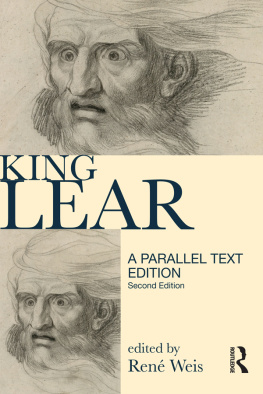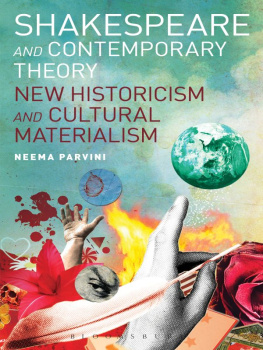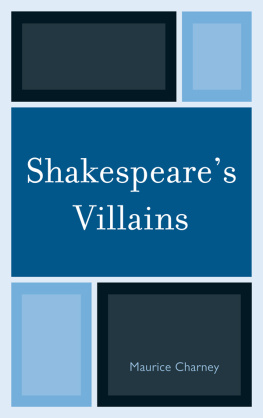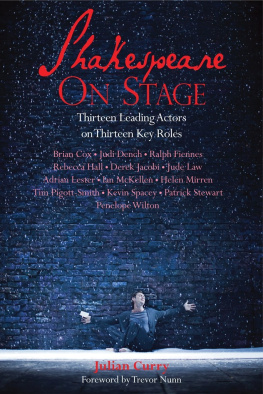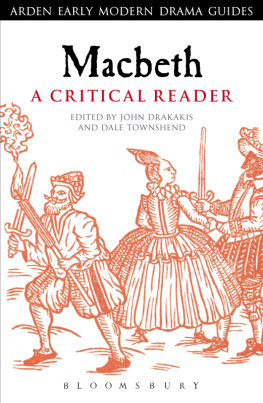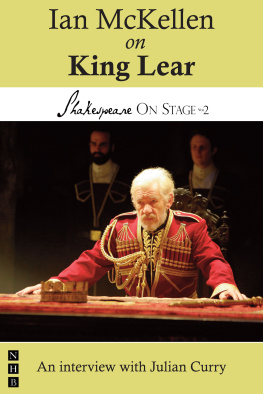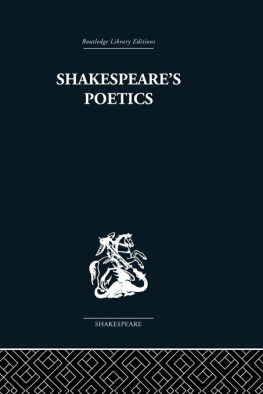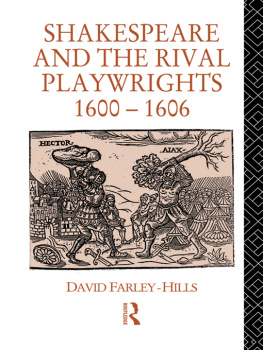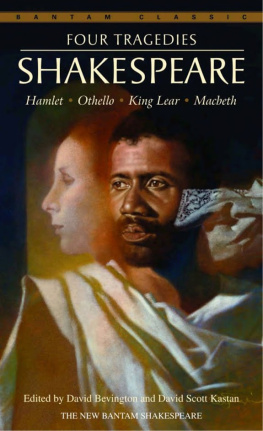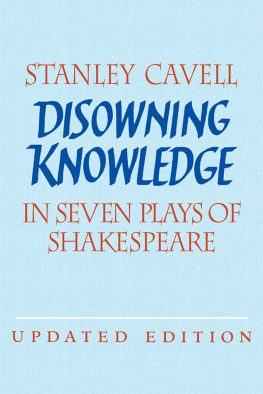Shakespeare William - King Lear: a parallel text edition
Here you can read online Shakespeare William - King Lear: a parallel text edition full text of the book (entire story) in english for free. Download pdf and epub, get meaning, cover and reviews about this ebook. City: London, year: 2013, publisher: Taylor and Francis;Routledge, genre: Science. Description of the work, (preface) as well as reviews are available. Best literature library LitArk.com created for fans of good reading and offers a wide selection of genres:
Romance novel
Science fiction
Adventure
Detective
Science
History
Home and family
Prose
Art
Politics
Computer
Non-fiction
Religion
Business
Children
Humor
Choose a favorite category and find really read worthwhile books. Enjoy immersion in the world of imagination, feel the emotions of the characters or learn something new for yourself, make an fascinating discovery.
- Book:King Lear: a parallel text edition
- Author:
- Publisher:Taylor and Francis;Routledge
- Genre:
- Year:2013
- City:London
- Rating:4 / 5
- Favourites:Add to favourites
- Your mark:
- 80
- 1
- 2
- 3
- 4
- 5
King Lear: a parallel text edition: summary, description and annotation
We offer to read an annotation, description, summary or preface (depends on what the author of the book "King Lear: a parallel text edition" wrote himself). If you haven't found the necessary information about the book — write in the comments, we will try to find it.
Shakespeare William: author's other books
Who wrote King Lear: a parallel text edition? Find out the surname, the name of the author of the book and a list of all author's works by series.
King Lear: a parallel text edition — read online for free the complete book (whole text) full work
Below is the text of the book, divided by pages. System saving the place of the last page read, allows you to conveniently read the book "King Lear: a parallel text edition" online for free, without having to search again every time where you left off. Put a bookmark, and you can go to the page where you finished reading at any time.
Font size:
Interval:
Bookmark:
KING LEAR

LONGMAN ANNOTATED TEXTS
GENERAL EDITORS
Charlotte Brewer, Hertford College, Oxford
H.R. Woudhuysen, University College London
Daniel Karlin, University of Sheffield
PUBLISHED TITLES
Chaucers Dream Poetry Helen Phillips and Nick Havely
Womens Writing in Middle English Alexandra Barratt
Women Writers in Renaissance England Randall Martin
Alexander Pope: The Dunciad in Four Books Valerie Rumbold
William Blake: Selected Poetry and Prose David Fuller
Victorian Women Poets Virginia Blain
Thomas Hardy: Selected Poems Tim Armstrong
KING LEAR

A Parallel Text Edition
Second edition
Edited by
REN WEIS

First published 1993 by Pearson Education Limited
Second edition published in Great Britain in 2010
Published 2013 by Routledge
2 Park Square, Milton Park, Abingdon, Oxon OX14 4RN
711 Third Avenue, New York, NY 10017, USA
Routledge is an imprint of the Taylor & Francis Group, an informa business
Copyright 1993, 2010, Taylor & Francis.
All rights reserved. No part of this book may be reprinted or reproduced or utilised in any form or by any electronic, mechanical, or other means, now known or hereafter invented, including photocopying and recording, or in any information storage or retrieval system, without permission in writing from the publishers.
Notices
Knowledge and best practice in this field are constantly changing. As new research and experience broaden our understanding, changes in research methods, professional practices, or medical treatment may become necessary.
Practitioners and researchers must always rely on their own experience and knowledge in evaluating and using any information, methods, compounds, or experiments described herein. In using such information or methods they should be mindful of their own safety and the safety of others, including parties for whom they have a professional responsibility.
To the fullest extent of the law, neither the Publisher nor the authors, contributors, or editors, assume any liability for any injury and/or damage to persons or property as a matter of products liability, negligence or otherwise, or from any use or operation of any methods, products, instructions, or ideas contained in the material herein.
ISBN: 9781408204122 (pbk)
British Library Cataloguing in Publication Data
A CIP catalogue record for this book can be obtained from the British Library
Library of Congress Cataloging in Publication Data
A CIP catalogue record for this book can be obtained from the Library of Congress
To
George Walton Williams


It is a pleasure to pay tribute to my predecessors. While my indebtedness to the texts of King Lear by Kenneth Muir (New Arden), G.K. Hunter (New Penguin), and the important Alexander, Bevington, and Riverside Complete Shakespeares is significant, my task would have been far more arduous without the labours of the editors of the Oxford Shakespeare (1986/87), and the achievement of Michael Warrens The Parallel King Lear (1989). It is their pioneering work on the two texts of King Lear which rendered a modern, parallel text edition of the play such as this one both possible and desirable. Jay L. Halios New Cambridge The Tragedy of King Lear (1992), which is based on the Folio, arrived too late for me to consult.
Among the many who have helped and advised, I would like to thank particularly Dr Bas Aarts, Professor David Bindman, Dr Daniel Karlin, Mrs Kathy Metzenthin, Dr Charlotte Mitchell, and Dr Alison Thorne. I am grateful to Mrs Oonagh McCarthy for her valuable advice and assistance during the early stages of this edition. My greatest debt is to my friend and colleague Dr Henry Woudhuysen of University College London, who preserved me from many infelicities and provided detailed guidance throughout this project. I owe much to his peerless expertise in the field of editing. At Longman I must thank Alysoun Owen for her encouragement and assistance during the later stages of this project, and Francis Dodds and Christine Firth for their advice. I also wish to thank the staff at the British Library, the University of London library, and University College London library for their help.
My indebtedness to Professor Karl Miller of University College London, and to Professor Ross Woodman of the University of Western Ontario in Canada, goes back a number of years, as does my gratitude to several generations of students from the Shakespeare seminar at University College London. I wish to thank Professor John Sutherland and Professor David Trotter for granting me sabbatical leave for the final lap of this project. I must thank Professor Tjaa Mikli for her generosity towards me over many years, and for her enthusiasm for King Lear. I am grateful to Maryse for her warm and affectionate welcomes in LaCelle St Cloud. Above all I want to thank Jean. Her sweet nature and rare intelligence have been an unfailing source of strength and inspiration. This is for her.
Ren Weis
Department of English
University College London
January 1993

We are grateful to the following for permission to reproduce copyright material:
courtesy of Harvard College Library, Widener Library.
In some instances we have been unable to trace the owners of copyright material, and we would appreciate any information that would enable us to do so.

We wish that we could pass this play over, and say nothing about it. All that we can say must fall far short of the subject; or even of what we ourselves conceive of it. (William Hazlitt)
The monolithic place of King Lear among works of English literature has rarely been contested. It has been called a Stonehenge of the mind because of its rough-hewn grandeur (Hunter 1972: 7), and in an important essay entitled The Once and Future King Lear Stanley Wells (1983) acclaims the play as one of the monuments of Western civilization (The Division of the Kingdoms: Shakespeares Two Versions of King Lear, ed. Taylor and Warren, 1983; hereafter Div: 3). Wellss testimony is particularly relevant in the Introduction to a parallel Lear text. He was one of the editors of the Oxford Complete Shakespeare (Wells and Taylor 1986), the first major edition of the works to treat Q and F as two different texts, and therefore belongs to the new disintegrationist school of King Lear scholarship, an influential group of textual scholars, critics and editors who have argued since the late 1970s that there is no ideal single King Lear text; rather there are two different texts, one based on the Quarto of 1608 (the Pied Bull Q) and another, revised Shakespearian version which was published in the first Folio of 1623. Wellss statement indicates that to subscribe to the two-text theory about Lear does not mean that ones instinctive aesthetic responses to the play/plays need be impoverished or diminished. The fact that neither of the two separate texts contains everything that Shakespeare wrote need not be taken to imply that he therefore got it wrong the first time round.
Next pageFont size:
Interval:
Bookmark:
Similar books «King Lear: a parallel text edition»
Look at similar books to King Lear: a parallel text edition. We have selected literature similar in name and meaning in the hope of providing readers with more options to find new, interesting, not yet read works.
Discussion, reviews of the book King Lear: a parallel text edition and just readers' own opinions. Leave your comments, write what you think about the work, its meaning or the main characters. Specify what exactly you liked and what you didn't like, and why you think so.

